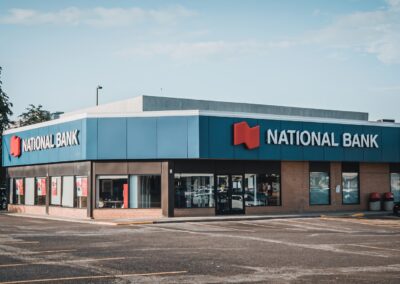Providing Access to Banking and Financial Tools for Underserved Populations
Empowering Underserved Populations Through Fintech
The advent of fintech and democratization of financial services is transforming the financial landscape, particularly in regions like Saudi Arabia and the UAE. By leveraging advanced technologies such as artificial intelligence (AI), blockchain, and generative AI, fintech is making financial services more accessible and inclusive. This democratization of financial services is crucial for empowering underserved populations who have historically been excluded from traditional banking systems.
In Saudi Arabia, the Vision 2030 initiative aims to foster economic growth and social development through technological innovation. Fintech plays a pivotal role in this vision by providing financial tools and services that cater to the needs of underserved populations. Digital wallets, mobile banking apps, and online lending platforms are enabling individuals and small businesses to access banking services without the need for physical bank branches. This increased accessibility helps bridge the financial inclusion gap and promotes economic participation.
Dubai, a global hub for fintech innovation, is also leading the charge in democratizing financial services. The city’s thriving fintech ecosystem offers a range of solutions designed to enhance financial inclusion. For example, peer-to-peer lending platforms allow individuals to obtain loans directly from other individuals, bypassing traditional financial institutions. Additionally, digital payment systems enable seamless transactions, reducing the reliance on cash and improving financial security. These innovations are particularly beneficial for migrant workers and low-income households, providing them with the tools needed to manage their finances effectively.
Harnessing Technology for Financial Inclusion
The use of fintech and democratization of financial services involves harnessing cutting-edge technologies to create innovative financial products and services. AI, blockchain, and the metaverse are at the forefront of this transformation, enabling financial institutions to offer personalized and secure services to a broader audience.
In Riyadh, AI-powered fintech solutions are revolutionizing the way financial services are delivered. AI algorithms can analyze vast amounts of data to offer personalized financial advice, credit scoring, and fraud detection. These capabilities enhance the customer experience by providing tailored services that meet individual needs. Moreover, AI-driven chatbots and virtual assistants are improving customer support, making it easier for underserved populations to access financial information and services.
Blockchain technology is another key enabler of financial inclusion in Dubai. By providing a secure and transparent ledger for financial transactions, blockchain reduces the risk of fraud and increases trust in the financial system. This technology is particularly useful for cross-border remittances, allowing individuals to send money to their families with lower fees and faster processing times. Additionally, blockchain-based identity verification systems can help unbanked individuals establish a digital identity, facilitating their access to financial services.
The metaverse, a virtual reality space where users can interact with digital environments and services, is also emerging as a powerful tool for financial inclusion. In Saudi Arabia, fintech companies are exploring the potential of the metaverse to provide immersive financial education and advisory services. By creating virtual branches and interactive financial literacy programs, the metaverse can help underserved populations gain the knowledge and skills needed to manage their finances effectively.
Promoting Sustainable Economic Growth
The integration of fintech and democratization of financial services not only enhances financial inclusion but also promotes sustainable economic growth. By providing underserved populations with access to financial tools and services, fintech empowers individuals and businesses to participate more fully in the economy, driving innovation and development.
In Saudi Arabia, fintech is playing a crucial role in supporting small and medium-sized enterprises (SMEs), which are key drivers of economic growth. Online lending platforms and crowdfunding solutions provide SMEs with access to capital that might otherwise be unavailable through traditional banking channels. This increased access to financing enables businesses to invest in growth opportunities, create jobs, and contribute to the economy.
Dubai’s fintech ecosystem is also fostering entrepreneurship and innovation. Digital banking services, such as mobile banking apps and online payment solutions, reduce the barriers to entry for new businesses. Entrepreneurs can easily manage their finances, process payments, and access financial services from anywhere, enabling them to focus on growing their businesses. Additionally, fintech incubators and accelerators in Dubai provide startups with the resources and support needed to develop and scale their innovative solutions.
Generative AI, which uses machine learning algorithms to create new financial products and services, is another catalyst for economic growth. In Riyadh, generative AI is being used to develop personalized investment portfolios, automated financial planning tools, and customized insurance products. These innovations not only enhance the customer experience but also drive efficiency and profitability for financial institutions.
Conclusion
The integration of fintech and democratization of financial services is revolutionizing the financial landscape, making banking and financial tools more accessible to underserved populations. Through the use of advanced technologies such as AI, blockchain, and the metaverse, fintech is empowering individuals and businesses to participate more fully in the economy, promoting sustainable economic growth. In regions like Saudi Arabia and the UAE, the adoption of fintech solutions is driving financial inclusion, fostering innovation, and enhancing the overall quality of life. As fintech continues to evolve, its role in democratizing financial services will remain critical in shaping the future of inclusive and sustainable economic development.
#FintechAndDemocratizationOfFinancialServices #FinancialInclusion #UnderservedPopulations #RiyadhFintechInnovation #DubaiFinancialTechnology #SaudiArabiaFintechGrowth #UAEDigitalBanking #AIInFintech #BlockchainInFinancialServices #TheMetaverseInBanking #GenerativeAIInFinance #BusinessSuccessInFintech #LeadershipInFinancialInclusion #ProjectManagementInFintech























